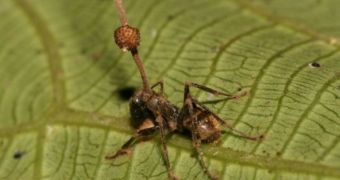The zombie-ant fungus is renowned for its ability to infect ants, and then make the insects spread its spores before finally killing them. A new study demonstrates that the ants may not be alone in their fight against this invader. Another parasite that can infect them has “anti-zombification” effects.
A group of investigators at the Pennsylvania State University (Penn State) have recently conducted a study on the fungus that makes the ants lose control of their bodies. They determined that a secondary infection with another parasite can counteract the effects of the former.
Penn State expert and team leader David Hughes says that the other parasite can help an entire colony survive infection from the zombie-ant fungus. If that were not the case, then most of the insects would be infested, and then forced to march to a mass grave located near their colony.
Here, they would die, and have the fungus spores blow out of their heads. Ants are not too fond of this fate, and prefer to be infected by the secondary parasite. This organism takes its toll on the insects as well, but it does prevent them from turning into zombies.
“In a case where biology is stranger than fiction, the parasite of the zombie-ant fungus is itself a fungus – a hyperparasitic fungus that specializes in attacking the parasite that turns the ants into zombies,” the team leader explains, quoted by Science Blog.
Details of the new study will appear in an upcoming issue of the peer-reviewed, open-access scientific journal PLoS ONE, which is edited by the Public Library of Science. Hughes is an assistant professor of entomology and biology at Penn State, and a member of the Center for Infectious Disease Dynamics.
“The hyperparasitic fungus effectively castrates the zombie-ant fungus so it cannot spread its spores. Because the hyperparasitic fungi prevents the infected zombie-ant fungus from spreading spores, fewer of the ants will become zombies,” he explains.
When analyzing infected zombie-ant fungi, researchers with the study team determined that only around 6.5 percent of their spore-producing organs remained intact. That is the equivalent of a 93.5 percent reduction in the severity of damages done to the ant colony.
“Even though there are a lot of dead and infected zombie ants in the neighborhood, only a few of the spores of the zombie-ant fungus will become mature and able to infect healthy ants,” Hughes adds.
“This complex interaction between ant colonies, their brain-manipulating parasites, and other fungi capable of lending assistance to the colony underscores the need to study social insects under natural conditions,” he concludes.

 14 DAY TRIAL //
14 DAY TRIAL //